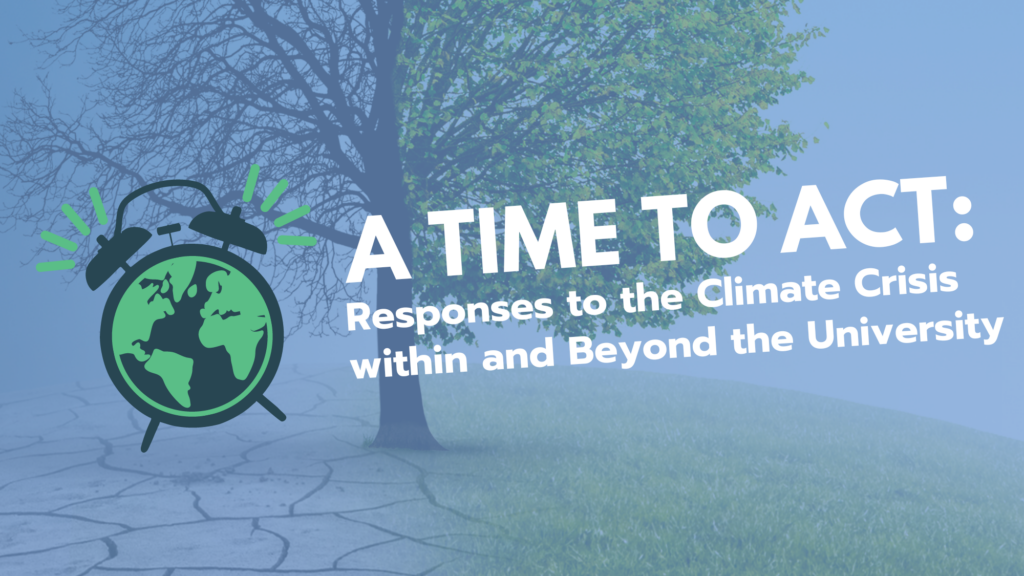
This semester Temple University Libraries is launching an inspiring new series called A Time to Act: Responses to the Climate Crisis within and Beyond the University. This series will focus on various discussions about creating a sustainable and environmentally equitable university campus and community. Throughout the semester, we will cover topics related to climate action in the university and beyond, including Temple’s sustainability research agenda, and how we can translate climate scholarship for local impact.
We will also discuss Temple’s physical plant, operations, and carbon future, as well as equity and community-focused planning strategies to build and strengthen climate justice and resilience in the Philadelphia region. This series is brought to you by Temple University Libraries, Temple’s Office of Sustainability, Tyler School of Art and Architecture, the Center for Sustainable for Communities, Tyler Climate Action Network, and the Department of Geography and Urban Studies.
“The climate crisis is one of the fundamental realities of our time,” Dean of Libraries Joe Lucia said. “It requires the concerted engagement of people from many different fields and backgrounds to be effectively addressed. It is a key aspect of the library’s mission as a social connector to bring together experts and community members from across the university to share ideas and think through big challenges and big issues. We are very excited to be a partner in this important set of events that will become a continuing area of focus in our programming.”
Further details of each event are listed below.
John Muir’s Tormented Landscape: The Return of Indigenous Memory to American Conservation
Thursday, February 29, 2-3:30 pm
Howard Gittis Student Center, Room 200C, 1755 N. 13th Street
In this lecture, Paul Robbins dissects naturalist John Muir’s 1912-1913 work, “The Story of My Boyhood and Youth.” This unconventional piece contains detailed descriptions of Native American life, reflecting a repressed memory of their expulsion. Muir’s romanticized view of the wilderness obscured indigenous land ownership. His evolving attitudes toward Native cultures enriched his work, but his influence on the national park system perpetuated the expulsion of native peoples. These expulsions, revisited as repressed memories, have significant implications for the future of conservation, highlighting the need to acknowledge and address the historical injustices against native peoples in preserving natural landscapes.
Paul Robbins is the dean of the Nelson Institute for Environmental Studies at the University of Wisconsin-Madison. With decades of experience as a researcher and educator, Robbins specializes in the political entanglements of environmental conservation, wild species protection, and land management and control. His research has included investigations of the politics of forestry and wildlife conservation in rural India, elk management on the settled fringes of Yellowstone Park, consumer chemical risk behaviors in North America, mosquito management, and a multitude of other topics. A reception will be held afterwards with light refreshments served.
Climate Communication Workshop: Learn How to Make Your Research Matter
Monday, March 25, 3-5 pm
Charles Library first floor event space, 1900 N. 13th Street
This event is for anyone interested in strategic science communication scholarship and bringing urgent social and environmental problems to the forefront of discussion. Meet other Temple climate scholars and advocates to strengthen Temple’s interdisciplinary scholarly community and translational research agenda.
Featuring keynote speaker Dr. Zachary M. Labe, Ph.D. Postdoctoral Research Associate at Princeton University. Assistant Professor Dr. Meghnaa Tallapragada, Department of Advertising and Public Relations, Klein College of Media and Communication, and Assistant Professor Dr. Becki Beadling, Department of Earth and Environmental Science, College of Science and Technology will also be speaking.
The Landscape of Climate Science
Monday, April 8, 5-7 pm
Charles Library first floor event space, 1900 N. 13th Street
Climate change is described in some quarters as a “crisis” and in others as a “hoax”, with a range of views in between. How can one square this with climate science, which should be more objective? This talk, led by Nadir Jeevanjee, will emphasize that there is a spectrum of climate science, ranging from well-established, “settled” science (such as global warming due to anthropogenic CO2) to highly uncertain frontier topics (such as various proposed “tipping points”). To properly interpret climate science, one must acknowledge the existence of this spectrum, and appropriately place climate and weather phenomena within it.
Jeevanjee studies the physics of clouds, radiation, and climate, using a hierarchy of approaches ranging from pencil-and-paper theory to comprehensive computer simulations. He currently is a Research Physical Scientist at NOAA’s Geophysical Fluid Dynamics Laboratory. This event will be co-sponsored by the Science, Technology, and Society network at Temple University.
Environmental and Climate Justice: Connecting Federal Policies to Local Action
Monday, April 15, 5:30-7:30 pm
Mazur Hall, Room 821, 1114 Polett Walk between 11th and 12th streets
Federal environmental and climate policy changes are intended to promote local and regional climate action, with a focus on equity and environmental justice. In this lecture, we will discuss if there is a need for more comprehensive and measurable strategies to ensure that cities and regions become truly equitable, environmentally just, and prepared for climate change.
Featuring Chitra Kumar, Managing Director of the Climate and Energy Program from the Union of Concerned Scientists, Russell Zerbo, Advocate, Clean Air Council, and Associate Professor Christina Rosan, of Temple University’s Department of Geography and Urban Studies. This event will be co-sponsored by Geography and Urban Studies and the Center for Sustainable Communities.
Community Conversation: Your Role in Decarbonizing Temple
Thursday, April 18, 10 am-12 pm and 1-3 pm
Charles Library first floor event space, 1900 N. 13th Street
Looking toward the future, Temple’s campus must be powered by innovative solutions that address Philadelphia’s current and evolving energy infrastructure, including renewable energy options. Become empowered with fellow Owls on how to combat climate change and encourage decarbonization at Temple and beyond.
Featuring Associate Professor of Instruction in Electrical Engineering Dr. Cory Budischak, along with student leaders in Temple Student Government, Temple Climate Action, and Temple Green Council; Director of Utilities and Energy Management, Kat Fink; Assistant Vice President and University Architect, James Templeton; Director, Office of Sustainability, Rebecca Collins; Senior Sustainability Manager, Caroline Burkholder, and climate leaders from other institutions.
Clean Air and Good Jobs: U.S. Labor and the Struggle for Climate Justice by Todd E. Vachon
Monday, April 22, 2-3 pm
Charles Library first floor event space, 1900 N. 13th Street
The labor–climate movement in the U.S. laid the groundwork for the Green New Deal by building a base within labor for supporting climate protection as a vehicle for good jobs. But as we confront the climate crisis and seek environmental justice, a “jobs vs. environment” discourse often pits workers against climate activists. How can we make a “just transition” moving away from fossil fuels, while also compensating for the human cost when jobs are lost or displaced?
In his timely book, Clean Air and Good Jobs, Todd Vachon examines the labor–climate movement and demonstrates what can be envisioned and accomplished when climate justice is on labor’s agenda and unions work together with other social movements to formulate bold solutions to the climate crisis. In this lecture, Vachon profiles the workers and union leaders who have been waging a slow, but steadily growing revolution within their unions to make labor as a whole an active and progressive champion for both workers and the environment.

